You might think of Hashimoto’s as a static disease.
A disease that causes a set of symptoms that you have to live with for the rest of your life.
This couldn’t be farther from the truth.
Instead, it’s more true to say that Hashimoto’s is a dynamic disease, one that changes and fluctuates over time.
And when your disease fluctuates, we call that a flare-up.
Why are flare-ups important?
Because their presence indicates that your body is damaging and destroying your thyroid gland!
This is obviously not something you want to occur, which is why it’s importnat for you to regonize it when it does.
If you ever experience these symptoms then you’ll know you’re in a flare up:
#1. Sudden or unexplained weight gain
As we dive into these symptoms you will probably notice that you are already dealing with many of them.
Unfortunately, due to how doctors treat thyroid patients, that isn’t uncommon.
When we talk about flare-ups it’s important to realize that a flare-up usually causes a sudden worsening of a thyroid symptom that already exists.
What do I mean?
Imagine that your thyroid is already causing some weight gain (which is the first symptom we are going to be talking about today).
Weight gain is a very common symptom of hypothyroidism (low thyroid function) and something that many patients with Hashimoto’s deal with.
A flare-up won’t make you slowly gain weight, instead, it will cause a sudden worsening of an already damaged metabolism.
So if you are someone who is already, let’s say, 20 pounds overweight and then suddenly, out of the blue, you gain 10 more pounds, that’s probably a sign of a flare-up.
This is assuming that you are making no changes to how active you are or to the food that you are eating during this time period.
The weight gain associated with a flare-up needs to be unexplained.
In other words, you can’t blame that weight on anything except your thyroid.
Unfortunately, weight gained during a flare-up often stacks on top of the weight you already had before the flare-up.
And this weight usually doesn’t go away when the flare-up is managed (unlike many of the other symptoms we will soon discuss).
For this reason, weight gain as a symptom of a flare-up should be taken very seriously and addressed as soon as possible.
Why does weight gain occur?
Because as your thyroid becomes inflamed (from the flare-up), thyroid function slows down which results in a slowing of your metabolism.
The slower your thyroid the slower your metabolism (1).
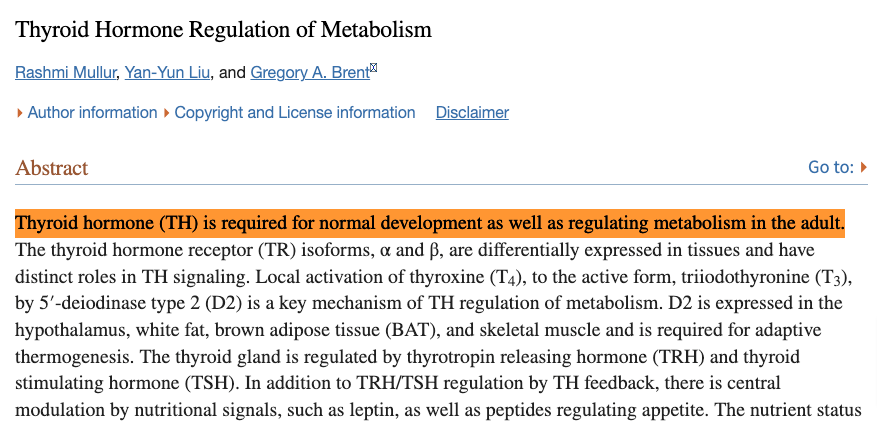
#2. Sudden or worsening fatigue
Next up is a sudden change in your energy levels.
As a patient with Hashimoto’s, you are probably well accustomed to living with some level of baseline fatigue.
Whether that’s from your thyroid directly or from its impact on your adrenals, fatigue is another very common symptom (2) of Hashimoto’s.
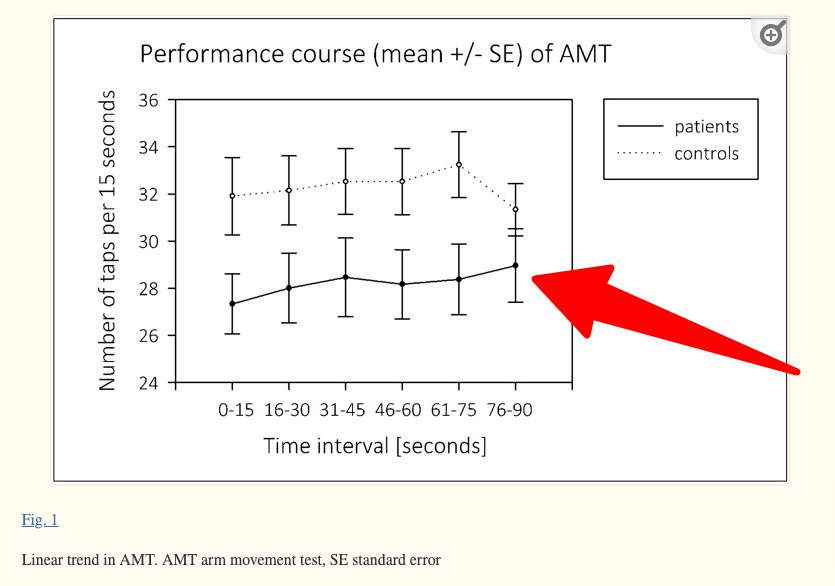
If you notice that your fatigue suddenly gets a lot worse, without noticing any changes to your sleeping patterns, then it may be a sign you are in a flare-up.
#3. Heat in the neck or thyroid gland area
Some patients with Hashimoto’s report that they feel heat in the neck over the area of their thyroid gland when they are in a flare-up.
This heat is most likely the result of increased inflammation in the thyroid gland which occurs during the flare.
Heat is always produced when there is inflammation present, the degree of that heat just depends on the degree of inflammation.

I’m sure you’ve all had an infection on your skin or a bug bite that feels hot to the touch.
That heat is a sign of inflammation.
Since your thyroid gland is under the skin, it’s more difficult to feel heat produced by the gland itself, but it’s still present for some people.
Under no circumstance is it normal for your thyroid to ever feel hot!
So this is one of the symptoms that always means something is wrong.
#4. Thyroid pain (uncommon but can occur)
Rarely, some patients may also experience thyroid gland pain during a flare-up.
Because of the way that the thyroid gland is innervated, it’s actually pretty rare for your thyroid gland to ever experience “pain”.
Pain in the thyroid gland itself typically occurs with trauma or with an infection of the gland (called subacute thyroiditis (3)).
But just because it’s rare doesn’t mean it can’t happen with Hashimoto’s.
There have been some case reports (4) of patients experiencing pain in their thyroid gland with Hashimoto’s.
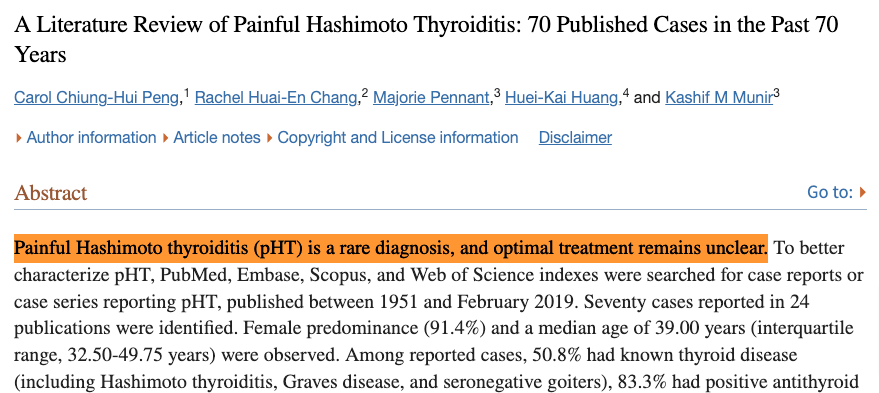
If you do experience this symptom, though, make sure you get it checked out because it may be a sign of something worse.
#5. Difficulty swallowing or feeling pressure in the neck while talking/eating/drinking
This symptom is quite common and occurs frequently during flare-ups.
As the thyroid gland enlarges (due to inflammation) it can press on the surrounding structures in your neck.
Your thyroid gland sits underneath your larynx (your voice box) and in front of your trachea (your breathing tube).
The esophagus sits behind both of these structures.
It’s not hard to imagine that there just isn’t a lot of extra space in this area of your neck.
So when something enlarges or gets inflamed and grows in size, it presses on the surrounding objects.
If your thyroid gland presses on your larynx then it may cause hoarseness or a change in your voice (this can also come directly from changes in thyroid function (5)).
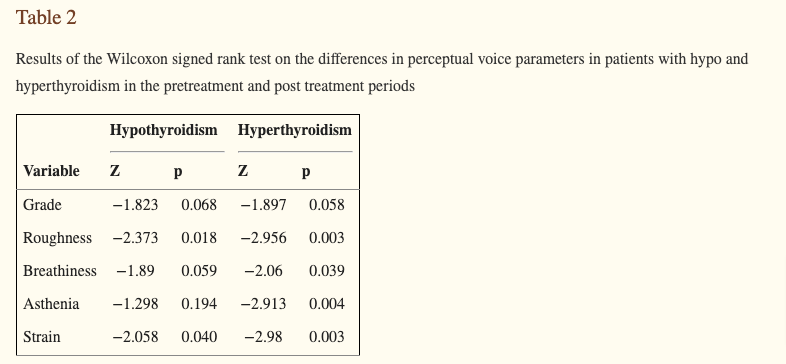
If your thyroid gland grows outward then it will feel like your skin is getting tighter and you will feel pressure (6) at the base of your neck.
If your thyroid gland pushes backward, then it will make swallowing, eating, and drinking more difficult.
These are all signs that your thyroid is enlarged, which can definitely occur due to inflammation.
Normally, these symptoms are not a huge deal because the thyroid can only enlarge so much.
Rarely, though, they can become a big problem and may require immediate medical attention, especially if they are interfering with your ability to breathe.
#6. A general feeling of weakness or malaise
Because a flare-up is really a problem with your immune system, you may experience some symptoms that mimic illnesses.
When you get sick with something like a viral illness, it’s not uncommon to just feel weak or puny compared to your normal healthy self.
Weakness or a general feeling of malaise is typical of viral infections.
These symptoms can also be associated with a Hashimoto’s flare-up.
Remember:
A flare-up is a sign that your immune is increasing its attack on your thyroid gland.
It’s the same immune system that responds to infections, it’s just directed at your thyroid gland instead of a pathogen.
What you may not realize is that many of the symptoms you experience when you are sick come from your body trying to fix the problem.
For this reason, there will be some spillover of symptoms when your immune system is activated for either an autoimmune disease or when protecting your body from a virus or bacteria.
#7. New joint pain and/or muscular pain (or worsening of existing pain)
This is another one of those symptoms that patients with Hashimoto’s deal with at baseline.
Changes to thyroid function may result in muscle (7) or joint pain.
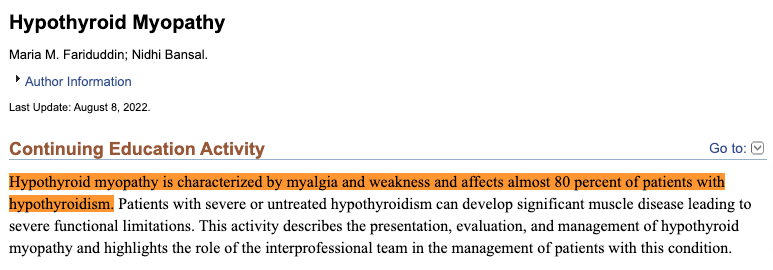
Patients experiencing a Hashimoto’s flare-up often experience worsening pain in their joints or muscles.
This symptom typically occurs in people who already had joint or muscle pain before the flare-up, but it can be a new symptom for some patients as well.
It can be particularly difficult to treat but you can learn more about what causes chronic pain in thyroid patients here.
#8. New racing heart or sensation of heart palpitations
Most of the symptoms we’ve discussed so are associated with low thyroid function which is most common when you experience a Hashimoto’s flare-up.
As inflammation ramps up in the thyroid gland during a flare-up it typically causes a slowing down of thyroid function.
But it can do more than just that.
Sometimes inflammation in the thyroid gland can result in increased release of thyroid hormone and symptoms associated with excess thyroid hormone.
A racing heart and palpitations are typically seen when this happens.
As thyroid hormone rushes into your system and into your heart, you may experience heart palpitations as your heart beats harder and faster (8).
This can result in a rapid heart rate but it doesn’t have to.
Sometimes you just feel the sensation of your heart beating even when your heart rate is normal.
If you are feeling the sensation of your heart beating make sure you count your beats per minute.
If it’s less than 80 or 90 beats per minute then you are not experiencing a rapid heart rate.
#9. Jittery sensation or uncomfortable rush (or nervous energy)
Jittery sensations, nervous energy, or an uncomfortable rush are also associated with the excess release of thyroid hormone from your thyroid gland.
These symptoms can make it difficult to sleep, may result in a slight tremor in your hands, and make relaxing very difficult.
They aren’t very common with a flare-up but they can occur.
#10. Abrupt onset of brain fog, difficulty concentrating, or inability to focus on difficult tasks
Just like other areas of your body, your thyroid can impact how well your brain functions.
When this happens, it’s usually manifested as brain fog.
It can be difficult to think of the words that you want to use when speaking, it can be hard to concentrate on tasks, you may find yourself uninterested in difficult work, and so on.
Why this occurs is not well known but it’s probably because your thyroid impacts neurotransmitters and neuron function in other ways.
While we don’t know exactly why it happens, we do know that it can get worse during a flare-up!
So if you notice a worsening of these symptoms then that may be an early sign you are in a flare-up.
#11. Changes to your gut function (usually constipation but can also be diarrhea)
The function of your gut can be used as an indirect measure of thyroid function.
When your thyroid is working as intended you shouldn’t experience changes in stool frequency.
When your thyroid slows down you may experience constipation (9) and when your thyroid speeds up you may experience loose stools or diarrhea.
Flare-ups can be associated with both because it depends on whether or not your flare-up is slowing down your thyroid or speeding it up.
The only downside to this symptom is that many other factors can influence your stools as well!
For instance, it’s much more likely that changes in your diet will impact your stooling frequency compared to your thyroid.
You can differentiate between diet-related stool changes and thyroid-related stool changes by looking at your other symptoms.
If you are experiencing increased weight gain, weakness, worsening brain fog, AND constipation, then that constipation is probably from your thyroid.
If you just experience constipation without any other symptoms then it’s probably related to something else (such as your diet).
#12. Acute symptoms of hyperthyroidism (rare)
I won’t include all of the symptoms of hyperthyroidism here but you should know that flare-ups can result in any or all of the symptoms of hyperthyroidism.
This is not very common, though, as a flare-up is typically short-lived and usually slows down the thyroid.
#13. Acute symptoms of hypothyroidism (common)
Flare-ups can also cause any or all of the symptoms of hypothyroidism.
I won’t list them all here but you can see a full list of low thyroid symptoms here.
You are probably already very familiar with these symptoms because many thyroid patients continue to experience them even when taking thyroid medication.
What To Do If you are in a Flare-up?
This is all good information to have but what are you supposed to do about it?
I mentioned previously that knowing you are in a flare-up is valuable but it’s only valuable if you do something about it!
If you let your flare-up fester and get worse then you are just allowing your condition to get worse over time.
And, believe me, you really don’t want to allow Hashimoto’s to permanently damage your thyroid gland.
If you find yourself in a flare-up based on your symptoms above then here are some steps you should think about taking (sooner rather than later, I might add):
- Get a full list of thyroid lab tests including thyroid antibodies and inflammatory markers – The first thing you’ll want to do is get a full set of thyroid lab tests to evaluate how well your thyroid is working. This will help you determine if you actually are in a flare and whether or not that flare is impacting your thyroid function. You should also get your thyroid antibodies tested as well (TPO antibodies and thyroglobulin antibodies). In many cases, thyroid antibodies will increase during a flare-up. In addition to these tests, it’s also helpful to get some basic inflammatory markers such as CRP and ESR. These are often elevated in a flare-up.
- Try to identify the trigger of your flare-up – If possible, take stock of what happened to you around the time of your flare-up. Were you under more stress? Did you change your eating habits? Were you recently sick with a virus or a bacterial infection? Were you exposed to environmental toxins? All of these, and more, can be potential triggers of a flare-up. Identifying the trigger of your flare can help you determine your next step… (Note: it’s not always possible to identify the trigger of a flare-up but that shouldn’t stop you from trying some basic treatments).
- Use therapies and treatments to get yourself out of your flare-up as quickly as possible – The next thing you’ll want to do is undergo treatments and therapies to fix whatever triggered your flare-up. If that’s stress, then you can use stress relaxation techniques. If the cause was toxins then detoxification protocols may be helpful. If the case was related to your diet then removing the offending foods would be in order. Even if you aren’t sure what caused your flare-up then doing basic things like eating cleaner, exercising regularly, ensuring you get enough sleep, taking basic supplements, and so on, are almost always helpful to some degree.
- Retest your labs to confirm a reduction in inflammation after using therapies – Finally, once you’ve undergone these treatments and therapies for several months you can recheck your thyroid lab tests including your antibodies and inflammatory markers. If your therapies are working then you should see a normalization of your thyroid function, a reduction in thyroid antibodies, and a reduction in inflammatory markers.
Final Thoughts
A Hashimoto’s flare-up is something that just about every patient with Hashimoto’s will experience at some point in their life.
The key is to understand when it happens so you can immediately take steps to try and fix it.
One of the best things you can do is simply be aware of the symptoms associated with a flare.
That way, when you experience these symptoms you know you need to take additional steps such as getting tested and trying to identify the trigger.
Now I want to hear from you:
Do you think you are in a flare-up right now based on your symptoms?
Have you experienced a Hashimoto’s flare-up before?
If so, what kind of symptoms did you experience?
Were you able to find out your trigger?
Did you get your thyroid labs checked?
Leave your questions or comments below!
Scientific References
#1. ncbi.nlm.nih.gov/pmc/articles/PMC4044302/
#2. ncbi.nlm.nih.gov/pmc/articles/PMC8217009/
#3. ncbi.nlm.nih.gov/books/NBK279084/
#4. ncbi.nlm.nih.gov/pmc/articles/PMC7003982/
#5. ncbi.nlm.nih.gov/pmc/articles/PMC6592446/
#6. ncbi.nlm.nih.gov/books/NBK285557/
#7. ncbi.nlm.nih.gov/books/NBK519513/
#8. ncbi.nlm.nih.gov/pmc/articles/PMC4318631/
#9. ncbi.nlm.nih.gov/pmc/articles/PMC2699000/

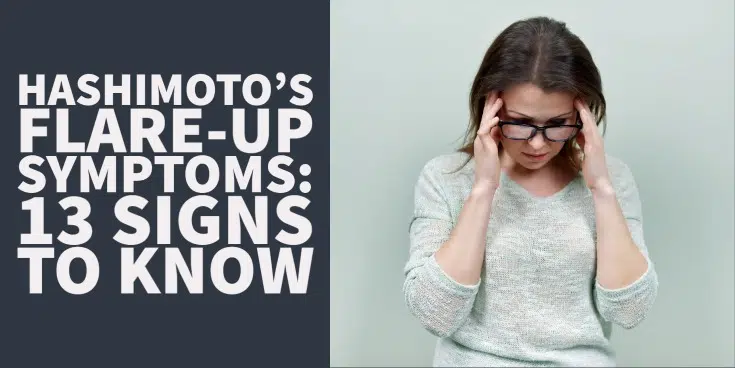








Dr. Childs, What is your recommended treatment when the flare is Increased Heart rate greater than 100bpm? I have had several of these along with muscle/joint pain and fatigue during my 11 year battle. This last flare had me in ER because of sustained SVT that would not return to normal quickly. I was given one dose of Lopressor and sent home with Inderal 10mg Q AM. I only needed to take for 2 days and everything returned to normal.
Hi Debbie,
You might consider the use of bugleweed and/or motherwort when in the hyperthyroid phase. Both of these supplements can help fight the symptoms of hyperthyroidism in different ways. If you would prefer a medication alternative then something like a beta-blocker could be used as well.
I tried to get lab tests but doctor insists thyroid is fine -I’ ve had has him pros for 30years- suddenly Gaines weight, cholesterol up, liver enzymes up+ constant flushes, very tired -made an appt. With endocrinologist but have to wait 3months- someone suggested adrenal less yes or no?
Hi Jamie,
It’s possible that your adrenals are contributing but there’s probably additional things that need to be addressed. I would recommend using this article to help you find someone: https://www.restartmed.com/how-to-find-a-doctor-to-treat-your-thyroid/
30 years, if you are female, would have me suspect a possible perimenopause/menopause interference. Progesterone levels drop much faster than Estrogen, which can easily lead to Estrogen Dominance. Estrogen is a thyroid antagonist. My hashi had been quiet, meds stable for over a decade…until menopause! Sure caught me by surprise and has taken quite the unraveling. When progesterone drops so suddenly, it really can pull the rug out under someone with hashi. Progesterone is anti-inflammatory, after all. Losing the protection of that ace in the hole so suddenly can really wreak havoc! I went on progesterone cream to help maintain a healthy hormonal balance as I wait for estrogen to also drop (can take years).
Is Orthostatic hypotension a symptom of a Hashimotos flare up or Thyroid disregulation? Or could it be ardenal problem?
Having fatigue with it as well.
Hi Patty,
It’s probably more likely related to your adrenals than your thyroid but both are likely contributing at least somewhat.
Literally everything in your video sounds like what is happening to me the heart palpitations are new and just started out of now where so much more joint pain that I haven’t had since I started a gluten free diet. But now it is back worse than ever. I have also been super fatigued and having a weird sensation in my throat where my thyroid is.
My TSH is normal but my TPO is high but have been told that I do not need medication and they will keep monitoring my TSH.
I am now going for a stress test and getting a holter monitor but it all seems like symptoms/ Hashimotos flare up to me. All signs point to this. My question is what can I do or how can I advocate for myself to my doctor. Should I get a second opinion? Thank you
Hi Alice,
Please see these resources for more information on how to do that:
https://www.restartmed.com/updated-hypothyroid-treatment-guidelines/
https://www.restartmed.com/how-to-find-a-doctor-to-treat-your-thyroid/
I also have a downloadable pdf that includes studies you can take to your doctor which can be found on this page:
https://www.restartmed.com/start-here/
I bought the Hashimoto’s Bundle. Everytime I take the Functional Fuel Detox, within 1 hour, I have extreme diarrhea. I started using it every other day, but I still have diarrhea after taking it. Living on Imodium isn’t fun. I finished taking all of the detox, but I can’t live like this. Is this detox something that I MUST continue????
Hi Debbie,
It is not required to continue taking it, by any means. However, if you are experiencing those types of symptoms, it’s likely that your body is probably trying to eliminate something but that the dose you are taking is too high for your body. I would recommend checking out this article for some more gentle detox tips: https://www.restartmed.com/thyroid-detox/
Is it possible to be in a flare-up for months?
Even with taking synthroid and dextroamphetamine I am always unbelievable exhausted along with many other symptoms. Without the dextroamphetamine I was needing to sleep again within 2 hours of waking up, if I didn’t sleep I would start to feel almost like hypoactive delirium, I was completely unable to function. It’s really hard because I miss a lot of work, and unfortunately most people don’t truly understand how bad it can get. They just think I’m skipping out on work because I’m ‘tired’. On top of that, I get sick a lot.. sinus infections, bronchitis, pneumonia. I haven’t felt healthy for years.
I also struggle with gout that I manage with lifestyle changes and home testing. I have noticed that when I have hypothyroid symptoms my uric acid levels jump up. Not a lot of labs to back it as my doctor is one of those TSH only types. Working on a change in care providers now.
Hi Don,
It may be worth pursuing a second opinion from a thyroid-literate doctor. You can use this resource to help you find someone near you: https://www.restartmed.com/how-to-find-a-doctor-to-treat-your-thyroid/
My husband who is 84 has anemia, diabetes, bradycardia (now with pacemaker). Had brain fog, fatigue before pacemaker which didn’t alter sx except pulse is now 67 and no hx of atrial fib. He had Covid (the first one) Dec 2019 and quite sick but no hospital. Second bout Sept 2022 lasted about 1 wk. Fatigue, brain fog, have persisted since before pacemaker. After seeing numerous Drs, only dx was “Long Covid” and old age .
After reading this article I’m wondering if his sx could be Thyroid related. Dr has tested TSH and T 4 which are normal so he won’t pursue any further testing.
Hi Sandy,
It’s always a possibility. The easiest way to confirm would be with standard tests for thyroid antibodies and an assessment of his symptoms to see if they are consistent with hypothyroidism. You can learn more about diagnosing Hashimoto’s here: https://www.restartmed.com/diagnose-hashimotos-thyroiditis/
Hi, how can I be diagnosed with Hashimoto’s if I have CVID? I didn’t know that I had it when I was finally diagnosed with hypothyroidism. I felt the symptoms though-mostly I was chasing extreme fatigue, really fast
weight gain after quitting smoking, a lump in my throat, and frequent arrythmias. I now receive IVIG once a month- would that cause any signs of inflammation to come up on lab tests? taking the meds is a roller coaster for me. I have had to ask to be tested every 3 months cause I an either way up or down. Have finally switched to Tirosint and my dose has gone from 137 mcg to 100 mcg so far. When I am hypo my body pain is worse(dr says not thyroid) and my lipids go up. brain fog is almost constant with some beautifully clear but short periods.
Should I request the whole battery of tests at this point and, if negative, where do I go from there? thanks for being there.
Hi Linda,
I’m a little confused based on your comment here. COVID and Hashimoto’s are two separate conditions. You can have one without the other or both at the same time but it’s possible to confirm the existence of one or both conditions with very specific tests. If you aren’t sure what condition you have, or if the symptoms are overlapping right now then getting a full set of thyroid lab tests would be a good way to rule out your thyroid as a potential cause of those symptoms. If I am misunderstanding your question, please let me know.
Since Thanksgiving I have had a flare in weight gain. I was not overweight but I have gained 6 to 7 pounds very quickly. I ordered my own labs through Life Extension because I thought I was having a thyroid flare. TPO was up 10 points and thyroglobulin down 3 points. I do not take any pharmaceuticals and I’m trying to manage with supplements – no drugs.
Hi Jeannette,
It’s fairly normal for the average person to gain weight during the holidays just due to changes in sleeping patterns, deviation from a normal diet, extra stress, decreased exercise, etc. The changes you mentioned in your lab results are pretty minor, at least when using standard units used in the United States.
You don’t have to see massive changes in thyroid antibodies to be considered in a flare-up, though, but if your only symptom is weight gain (without any of the others) then I would probably look to the normal causes of holiday weight gain first.
Every summer for past 3 years, I’ve had what I’ve been calling a Hashimotos flare up. In the heat and humidity of the summer, I have become completely fatigued, can’t get off the couch kind of fatigue. My thyroid labs are good at that time and all other labs have been checked as well. No one has been able to help including PCP, naturopath, acupuncturist. Ideas please? Thank you.
Hi Cynthia,
There have been studies that have linked exacerbations in autoimmune conditions to extreme temperatures. It’s probably not the weather per se, but rather the abrupt change in weather conditions. If you have your autoimmune disease under control prior to the changes then these swings should be at least somewhat minimized.
I experience the same, especially in the summer, I feel like I have “summer fatigue” bad.
Yes. Had all this yesterday. Increase in fatigue in daytime, high anxiety at night. Voice slightly rough feeling, throat a bit tight like beginning of a cold, heart palpation, slight ache not pain below ears, a tinge of ache toward gland, muscle cramps very slightly. I drank a few cups of echinacea sleepy time. Had no idea until I read up it can mess with autoimmune. Says right on box now. I think it set me off, it’s been awhile since a flare. Luckily very mild pots symptoms. Excellent article
Hi! On a recent, standard annual exam, my blood tests results came back with TSH levels of 4.3 and free T4 of .88 (t3 and tpo weren’t measured on this bc this was just my regular annual labs). Upon seeing these numbers, my doctor would like me to come back in 3 months to have my thyroid levels checked, to see if it’s hypothyroidism and if I need to begin treatment. To me, waiting 3 months of “wait and see” seems a bit long. If I can take steps to improve my numbers and PREVENT falling into hypothyroidism, I’d love to. Any suggestions?; one begun to eat 1-2 Brazil nuts a day and a sheet or two of seafood. (I’d really cut back on my salt intake the past 2 years or so, and also haven’t eaten much fish so I think my iodine levels may have decreased significantly). Thanks!
Hi Lg,
Yes, there are plenty of things you can do instead of just sitting around and waiting. Please see this article for more information: https://www.restartmed.com/natural-thyroid-remedies/
Hi there dr childs hopefully you can help me with this problem. A week ago I started to have really bad pain right across my shoulders. Been taking pain tablets and rubbing creams on my back. Didn’t know this maybe thyroid problems, plus sometimes get short of breath. But I put it down to anxiety. And sometimes feeling low for no reason. By the way I have underactive thyroid. Thanking you Linda
Hi Linda,
Anxiety could cause something similar but it’s always a good idea to get checked out if you are short of breath. Thyroid problems can cause a lot of different symptoms and problems but I would say the symptoms you are experiencing would be uncommon if they were truly thyroid-related.
Are you taking new patients and if so how can I begin the process? Ty
Hi Melissa,
I am not seeing patients but you can use this resource to help you find someone: https://www.restartmed.com/how-to-find-a-doctor-to-treat-your-thyroid/
Hello,
I have been taking Synthroid for about 14 years. I started on 25mcg and just went up from there. I really don’t like taking a med everyday as I do not feel that my dx was warranted. I had just had my third and last child. She wasn’t even a year old and my doc told me that I might lose some wt with this med and it might help my migraines. NEITHER was true. I had perfectly NL ultrasound of my thyroid gland/ had another ultrasound over 10 years later (about 4 years ago) and my new doc said that my gland was not NL and looked “mushy” and abnormally formed. I have weened myself back to 25mcg and if I am more tired take a 50mcg tab. I have moved to Asheville, NC 3 years ago and my current doc doesn’t want to test my antibodies again despite me asking her. I went to an Endocrinlogist here but it felt like they didn’t care. Not sure what I should do- please let me know your thoughts.
Thanks,
Zoe
PS I have experienced all of the above symptoms but manage them on a daily basis. Thank u for list out all of them!!
Hi Zoe,
The best thing you can do is find a thyroid-literate doctor to help guide you. You can use this resource to help: https://www.restartmed.com/how-to-find-a-doctor-to-treat-your-thyroid/
Dr. Childs,
Could a Covid infection trigger a Hashimoto’s flare?
Thanks,
Jackie
Hi Jackie,
Any infection or illness has the potential to trigger a flare-up so, yes, it could.
Thanks for replying. I had Covid in August and was attributing fatigue that I had for the past few months to that. However, other symptoms started appearing such as brain fog, constipation, anxiety, and very dry, painful eyes. My labs came back today TSH 3.43 so I guess covid had an impact. Have you ever heard of dry, painful eyes being a Hashimoto’s symptom? I have questioned doctors about this and they say only Graves disease affects eyes. What do you think?
Thank you,
Jackie
These are my latest labs/symptoms. I’m currently not on any medications because I’m in “range”
My TPO has increased from 48 to 85 and my Calculations as follows: Free T 3/Reverse T 3 Ratio
symptoms are worse.
should be greater than 0.20 Free T3 Optimal range 3.6-4.2
Mine is 0.18
Mine is 2.9
Free T4 Optimal 1.3-1.8
Mine 1.1
Top symptoms are: Annoying Ringing in Ears, Chronic Fatigue, Body Inflammation, Nodules with Neck and Facial Swelling, Foggy Brain, Memory Loss, and about 10 others.
I’m requesting to start on 5mcg T3 ×2 day Not sure if my Dr. Will go for it. What are your thoughts?
Currently experiencing a flare up. I get blood work frequently and last time I had it checked my tsh level was good. Not sure what caused this flare up. My goiter is definitely enlarged. I think I have been over doing the physical activity and my body is telling me.
Hi Suezzette,
Environmental factors (such as stress and lifestyle problems) are usually responsible for flares, so your suggestion that it may be related to your physical activity is likely spot on.
Dear Doctor… have been following and reading your blogs and articles over the years dealing with my Hashimoto’s TH1 dominance which later was exacerbated by Sjrogrens and TH2 dominant flareups… it has been difficult dealing with the sensitivities of both cytokines…
Over the last month I was dealing with severe knee pain issues so much so that I went to the orthopedic for a Cortizone shot when massage therapy and chiropractic and stretching techniques were not helping. Getting to the point the knee finally gave out and I ended up having to have an MRI thinking it was time for surgery. And suddenly overnight my knee got better….. imagine my surprise to see that muscle and joint issues can be symptomatic of a flareup! Thank you for that information it answers so many questions with how I could not walk one day and then be fine the next! I have reviewed your supplements however with my TH1 dominance I cannot take a lot of of your products with Ashwaganda Astragalus… etc. which is very frustrating. I do buy the majority of my supplements and single vitamin, herb form because of this. Regardless I want to say thank you for the information you have provided for so many of us struggling.